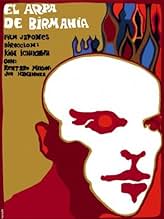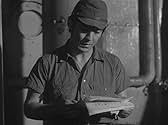A conscience-driven Japanese soldier traumatized by the events of WWII adopts the lifestyle of a Buddhist monk.A conscience-driven Japanese soldier traumatized by the events of WWII adopts the lifestyle of a Buddhist monk.A conscience-driven Japanese soldier traumatized by the events of WWII adopts the lifestyle of a Buddhist monk.
- Nominated for 1 Oscar
- 4 wins & 3 nominations total
- Kobayashi
- (as Takeo Naito)
- Baba
- (as Akira Nishimura)
- Director
- Writers
- All cast & crew
- Production, box office & more at IMDbPro
Featured reviews
A unique use of WWII as a stage
Transformed
"Down in Burma, the soil is red. So are rocks"
More melodramatic than his harrowing Fires On The Plain, Kon Ichikawa's The Burmese Harp is still an excellent film and a fascinating glimpse at another perspective of the 2nd World War than the usual (myopic and infantile) Hollywood triumphalism. As with many Japanese films from this period, from Kurosawa to Godzilla, it has an elegiac and reflective quality to it born of the shock and disillusionment that followed the war.
I personally was a little uncomfortable with the first 20 minutes of the film that were a little hokey with the singing platoon trying to slip through the forests of Burma to the Thai frontier. However, the film really begins to become compelling and very poetic with the character Mizushima's mission to Triangle Mountain and his voyage south to Mudon to rejoin his unit now in prison camp. Undergoing a symbolic `death' and injured, he is nursed by a priest, but steals the priest's garb as a disguise. However, on the way he passes great numbers of Japanese and is horrified by what he sees. When he arrives at his destination and is staying at a monastery, one monk comments, `You seem to have come through such severe hard training.' He cannot return to his unit. He is determined to bury the dead, to extend empathy to each of them and to pray for their souls. The physical journey is symbolic of a physiological and spiritual journey and is some very creative and effective storytelling. There is much more to the movie, plot wise and thematically, than this, but this is what impressed me most.
The imagery is incredible whether it is raindrops collecting and then running along barbed wire, dripping off; or the mud along the riverbanks; or the scene of Mizushima burying corpses at the river, a few villagers standing behind, watching; or the priest bathing in the river; or the shot of Mizushima disappearing into the mist. There is one moment in the prison camp which occurs during a rainstorm. I was really impressed with the natural lighting which gave me the sense of being there. I have looked out windows on days like that as those characters are and the experience "feels like that scene looks". It is incredible how evocative the Japanese films of the period were.
The film reminded me of Stone's Platoon with similar music, symbolism, characters, and melodrama. It also seems to have affinities with Apocalypse Now, in that the central concern is not action or tension (though they do not lack these qualities) but potent ideas and a sense of mystery. Both Apocalypse and Harp involve `pilgrimages' and characters transformed by the horror of the situation. They both involve characters unable to return home after this evolution. I do not know if either of these films was influenced by The Burmese Harp, but if they were they modeled on an excellent and moving predecessor.
Akira Ifukube's score is classic and will probably sound somewhat familiar to the viewer. He has scored nearly 260 films, including films in the popular Zatoichi series and many of Toho's sci-fi films.
a movie to carry with you
What's really sad is that you can't get the movie on DVD!
war as existential crisis
Ichikawa's iconic piece contains a strong anti-war theme that survives beyond its 1945 setting. Mizushima's troop are timeless, soldiers dreaming of homes, wives, town festivals; clinging to nostalgia to guide them home and fighting on for each other rather than any greater cause inspired by the imagined national community. Much more identifiable with the period are the troop holding out against the British even after national surrender, fanatics looking to die for an Emperor who has forsaken them rather than return to their families and rebuilding of the community. Among these men, there are no songs.
Mizushima's conversion from soldier-musician to selfless monk symbolises a state of reflection that follows all armed conflict. The film has been criticised for failing to confront the barbarism of the Imperial army, but this lack of identification with specific national failings is what gives the film a theme that transgresses to other cultures, conflicts and evils - the coming to terms with a life to be lived in the aftermath of horror. The flaws on the Yamato spirit may not be interrogated, but the atrocities of war are present, most visibly in Mizushima's encounter with the rotting flesh of fallen comrades being picked over by scavenger birds.
The framing is impeccable, and those looking for a quintessential Japanese aesthetic will be surprised by the extensive use of closeups. The music is spare and suitably evocative of military camaraderie and frightened young men coping far from home. Mizushima's journey is both symbolic and highly plausible, as is the reaction of his brothers-in-arms. Great cinema in its own right, and at the very top of the tree in anti-war movies.
Did you know
- TriviaViewers familiar with Godzilla (1954), may recognize many of the cues present in The Burmese Harp's soundtrack, as composer Akira Ifukube adapted Godzilla's requiem theme into several pieces heard throughout the film.
- GoofsThe modern harp (with its pedal changes and its consequent ability to make changes of harmony, in particular)that is played throughout on the film's soundtrack does not match the much more basic instrument shown in the film.
- Quotes
Captain Inouye: [Excerpt from Mizushima's letter, which Captain Inouye reads to his men as they sail back to Japan] As I climbed mountains and crossed streams, burying the bodies left in the grasses and streams, my heart was wracked with questions. Why must the world suffer such misery? Why must there be such inexplicable pain? As the days passed, I came to understand. I realized that, in the end, the answers were not for human beings to know, that our work is simply to ease the great suffering of the world. To have the courage to face suffering, senselessness and irrationality without fear, to find the strength to create peace by one's own example. I will undergo whatever training is necessary for this to become my unshakable conviction.
- ConnectionsFeatured in Burden of Love (1955)
- SoundtracksHanyuu no Yado
(Japanese Version of 'Home Sweet Home')
- How long is The Burmese Harp?Powered by Alexa
Details
- Release date
- Country of origin
- Languages
- Also known as
- El arpa de Birmania
- Filming locations
- Production company
- See more company credits at IMDbPro
Box office
- Gross US & Canada
- $20,015
- Opening weekend US & Canada
- $4,569
- Oct 20, 2024
- Gross worldwide
- $33,763
- Runtime
- 1h 56m(116 min)
- Color
- Sound mix
- Aspect ratio
- 1.37 : 1
































